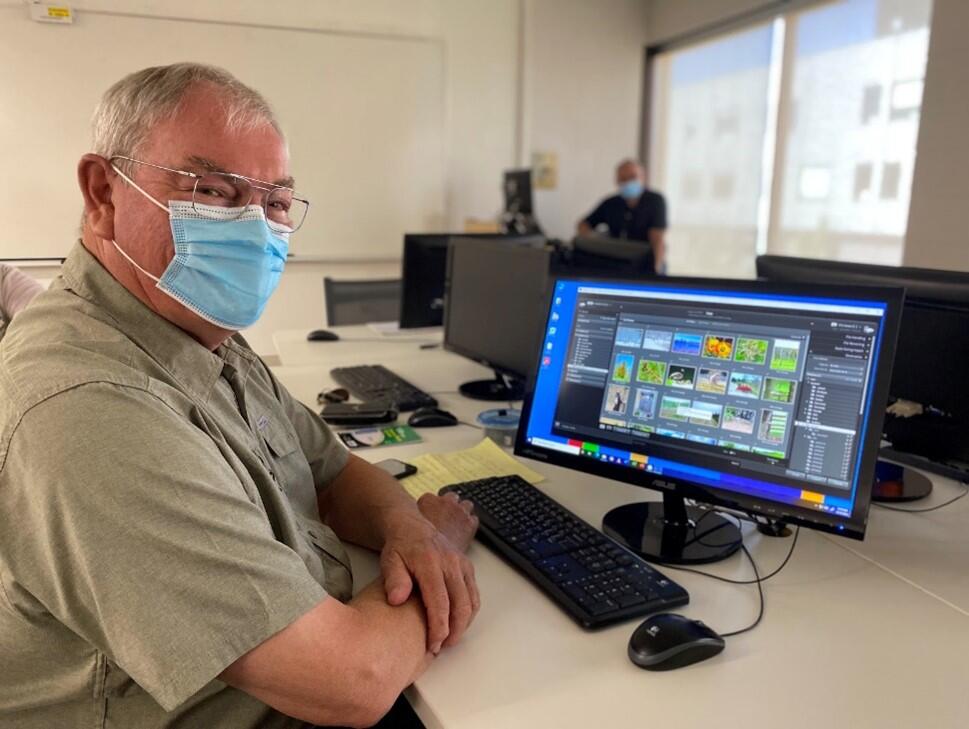Conestoga’s dual-credit programs give high school students the opportunity to explore college life and learning while earning credits.

Adults can participate in Conestoga's dual-credit programming as well. Through the program, David Bint, 75, completed his high school diploma.
Conestoga works with 12 school boards to offer a wide range of dual-credit programs on eight of its campuses as well as many off-site locations. Close to 1,700 students enrol annually in this specialized academic program intended to help students transition successfully to post-secondary studies.
“It allows students to have that experience on campus,” said Rosie Hessian, chair of the School of Interdisciplinary Studies.
Dual-credit programs support eligible Ontario secondary school students to complete their high school diploma and make a successful transition to a college or apprenticeship program. The primary focus is students facing challenges to completing requirements for graduation, but have the potential to succeed in college or apprenticeship.
Dual-credit programs are under the umbrella of the provincially funded School College Work Initiative, started in 1997 to fund activities that support students in secondary school and help with the transition to post-secondary education.
Along with dual-credit programs on Conestoga campuses, the college runs programs at off-site locations and offers activities, workshops and community outreach.
This winter term, a photoshop dual-credit program will be run at the Conestoga-Milton IELTS Centre on Main Street. Opened in 2021, the International English Language Testing System is a world-recognized assessment of English language proficiency for those who wish to study, work or immigrate in an English-speaking environment.
Conestoga will open two new Milton locations in 2024 and the plan is to offer dual-credit programs at those sites as well.
Courses are taught by a Conestoga instructor and all credits are transferrable to other colleges.
Conestoga’s retention and success rates always beat the provincial average.
In 2022-23, the college saw a 97 per cent student success rate at completing their course, compared to 93 per cent provincially. Retention reached 92 per cent, compared to 89 per cent provincially.
The secret to Conestoga’s success?
“It is a team approach. College faculty, staff, school boards, and dual-credit teachers support our students - ensuring success and retention in their programs,” Hessian said.
Through various Conestoga supports and departments, faculty and dual-credit teachers assist students to overcome barriers to learning and completing credits.
Adults can also take advantage of the program - the route that helped David Bint finally earn his long-awaited high school diploma. He left school after finishing Grade 11 to join the Metro Toronto Police, but his goal for many years while working as an officer was to graduate from high school.
This spring at age 75, Bint did just that. Bint joined the digital imaging dual-credit classes at the Kitchener - Doon campus, driving almost an hour and a half each way from North Wellington County.
Bint had a strong work ethic and eye for beautiful photographs, but the technical, computerized side was a challenge and many days the senior was tempted to quit. He credits much of his success to his Conestoga instructor, Brian Riddell, who gave extra support to help Bint master the digital aspects of photo editing. Classmate Darius Bride also stepped up to become his unofficial tutor and motivator.
Buoyed by all the encouragement, Bint completed the courses, saying that “dropping out again was not an option.”
With his dual credits as two of his final credits, Bint crossed the stage at Continuing Education’s commencement in June 2023, winning the North Wellington Program Award for outstanding performance and inspiring commitment.
The School of Interdisciplinary Studies prepares graduates for today’s global economy. Courses and programs have been designed to build skills essential to operations of effective workplaces through language, communication and liberal studies, and with practical experience through real-world, hands-on learning.
